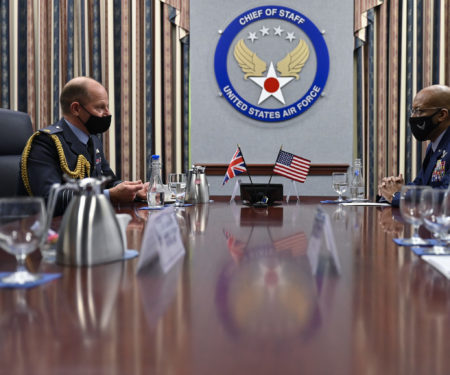Radar Sweep
AFA to Host Lt Gen David Krumm for AFA Warfighters in Action
Lt. Gen. David A. Krumm, commander of Alaskan Command, United States Northern Command and 11th Air Force, will participate in the Air Force Association’s virtual Air and Space Warfighters in Action speaker’s series on April 28 at 1:15 p.m. EST. Krumm also serves as the senior military officer in Alaska, responsible for the integration of all military activities in the Alaskan joint operations area, synchronizing the activities of more than 21,000 Active-duty and Reserve forces from all services. As Commander of the Alaskan Region of the North American Aerospace Defense Command, Krumm directs operations to ensure effective surveillance, monitoring, and defense of the region’s airspace. He is also responsible for the planning and execution of all homeland defense operations within the area of responsibility, including security and civil support actions. Attendance for the event is free, registration is required.
Accelerating Change for Rapid Global Mobility: Delivering Joint Force Success in the High-End Fight
“Rapid Global Mobility underpins Joint Force global power projection. It is integral to Joint Force success across the competition continuum—from humanitarian assistance and disaster relief operations to armed conflict. Without a credible, interoperable mobility force capable of projecting and sustaining Joint Force combat power at strategically relevant speed, scale, and distance, the United States cannot compete in the modern world. To meet this requirement, Air Mobility Command is shifting focus to high-end adversaries, maximizing full-spectrum readiness across its core missions while expanding Joint Force capability and interoperability, and modernizing for the future battlespace. By accelerating the advancement of Rapid Global Mobility capabilities, Air Mobility Command is transitioning from an enabler to an indispensable maneuver force, ensuring the Joint Force can compete, deter, and win across the competition continuum both today and in the future,” writes Air Mobility Command boss Gen. Jacqueline D. Van Ovost in the latest Mitchell Institute forum paper.
Biden’s Pentagon Policy Chief Colin Kahl Confirmed With GOP Senators Absent
The Senate confirmed Colin Kahl to be the undersecretary of defense for policy in a 49-45 party-line vote on April 27. With Kahl’s confirmation, the former national security adviser to then-Vice President Biden will assume the No. 3 civilian job at the Pentagon, overseeing strategy, nuclear deterrence, missile defense, international cooperation, and plans and policies.
Space Force Sees Need for Civilian Agency to Manage Congestion
The U.S. Space Force is not too worried at this point that the growth of commercial space activity is creating safety issues. But things could change if space traffic and debris are not managed, said Gen. David Thompson, vice chief of space operations of the U.S. Space Force.
US State Department Cleara Australia to Buy MQ-9B Drones
The U.S. State Department approved a $1.6 billion foreign military sale of MQ-9B drones for Australia. The package includes up to 12 MQ-9B aircraft made by General Atomics, as well as Honeywell engines, ground control stations, training simulators, and various satellite terminals and communications equipment necessary for the MQ-9 pilot and sensor operator to control the drone from a remote location.
Spy Satellite Launched from Vandenberg Air Force Base
A highly classified National Reconnaissance Office spy satellite was launched from Vandenberg Air Force Base, Calif., on April 26 with the help of one of the last Delta IV rockets.
PODCAST: Command Perspective: The Royal Air Force
In episode 20 of the Aerospace Advantage podcast: “Command Perspective: The Royal Air Force,” Air Chief Marshall Sir Mike Wigston, the head of the Royal Air Force, sits down with Mitchell Institute for Aerospace Studies dean retired Lt. Gen. David A. Deptula and executive director Doug Birkey for an in-depth conversation regarding key opportunities and challenges facing his service. The podcast explores everything from new aircraft investment decisions and national security space perspectives, to NATO’s future vector and the global threat environment from a UK perspective.
The Air Force Is Using Quantum Computing to Track Unmanned Aircraft
U.S. Air Force researchers are partnering with a quantum computing company to use its machine learning algorithms, Axios has learned. Why it matters: Quantum is the next generation of computing, and its growing adoption by the military shows the progress of the technology as it gradually moves out of the lab and into the real world.
VIDEO: The US Air Force Wants to Beam Solar Power to Earth from Space
The Air Force Research Laboratory (AFRL) is developing a project called SSPIDR ("Space Solar Power Incremental Demonstrations and Research"), which aims to mature the technology needed to harvest solar energy in space and beam it down for use on Earth.
Why Millions of the Pentagon’s Dormant Internet Addresses Suddenly Sprang to Life
During the final minutes of the Trump presidency, an obscure company in South Florida announced to the world’s computer networks that it would begin managing a massive swath of the Internet owned by the U.S. military. In the months since, the company has claimed control of nearly 175 million IP addresses. Such huge chunks of traditional Internet real estate, amounting to almost six percent of usable addresses in the original addressing scheme of the Web, would be worth billions of dollars on the open market. With no public explanation of what had taken place, the dramatic shift in IP address space allotment sparked impassioned speculation among network administrators and the Internet industry. That interest only increased when the WPentagon, after weeks of inquiries from The Washington Post, finally offered an explanation.
Blue Origin Protests NASA Human Landing System Award
The company also argued that NASA “unreasonably favored” SpaceX’s Starship lander in its evaluation. SpaceX, it argued, needs to develop a fully reusable heavy-lift launch vehicle rapidly and use “never-before-tested on-orbit refueling” to be successful. “In contrast, Blue Origin’s proposal is compatible with existing launch vehicles, utilizes only 3 launches, and employs heritage systems that have been flight tested,” it argued.




